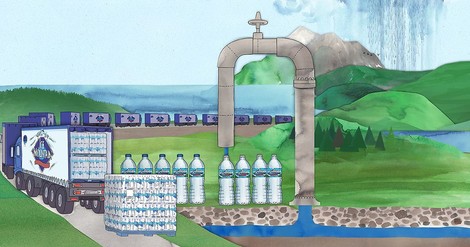Your podcast discovery platform
Curious minds select the most fascinating podcasts from around the world. Discover hand-piqd audio recommendations on your favorite topics.

piqer for: Global finds Globalization and politics Technology and society
Turkish journalist, blogger and media expert. Writes regular columns for The Arab Weekly and contributes to Süddeutsche Zeitung, El Pais and the Guardian. An European Press Prize Laureate for 'excellence in journalism' in 2014, Baydar was awarded the prestigious 'Journalistenpreis' in Germany by Südosteuropa Foundation in February 2018.
How Nestlé Makes Billions Out Of Water By Paying Almost Nothing
In the middle of rural Michigan, a windowless building—with the size of Buckingham Palace—may look dull at first sight, but interesting enough to look into for understanding what Nestlé, which runs around 100 bottled water companies in 34 countries across the planet, is up to.
The Michigan operation is only one small part of Nestlé, the world’s largest food and beverage company. But it illuminates how Nestlé has come to dominate a controversial industry, spring by spring, often going into economically depressed municipalities with the promise of jobs and new infrastructure in exchange for tax breaks and access to a resource that’s scarce for millions. Where Nestlé encounters grass-roots resistance against its industrial-strength guzzling, it deploys lawyers; where it’s welcome, it can push the limits of that hospitality, sometimes with the acquiescence of state and local governments that are too cash-strapped or inept to say no. There are the usual costs of doing business, including transportation, infrastructure, and salaries. But Nestlé pays little for the product it bottles—sometimes a municipal rate and other times just a nominal extraction fee. In Michigan, it’s $200.
Nestlé alone sold $7.7 billion worth worldwide. It is the biggest company globally in terms of sales.
Nestlé Waters, the Paris-based subsidiary, owns almost 50 brands, including Perrier, S.Pellegrino, and Poland Spring.
In this excellent piece of investigative journalism, Caroline Winter sheds light on the root causes of why the bottled water business has been booming and how a company like Nestlé, with obvious shades of transparency, overcomes the local pockets of civilian resistance.
